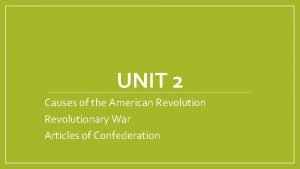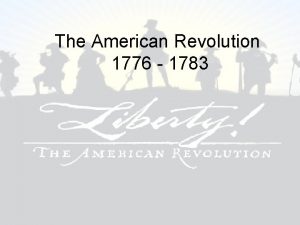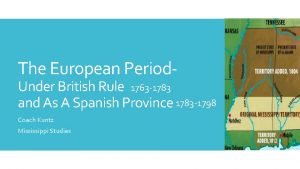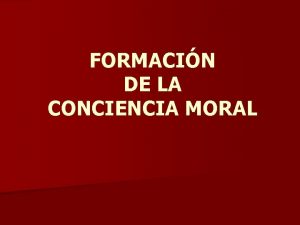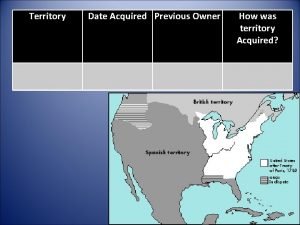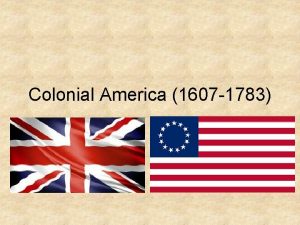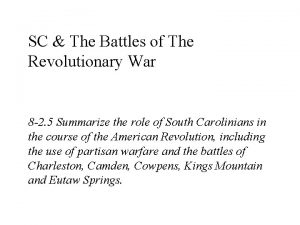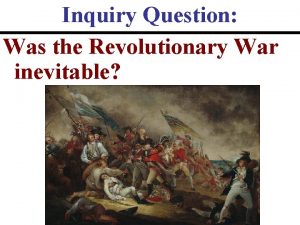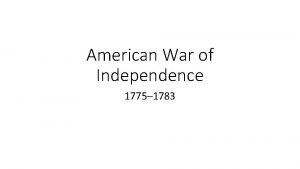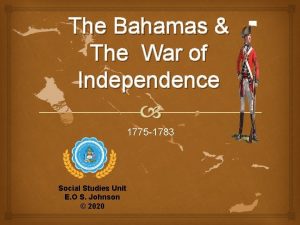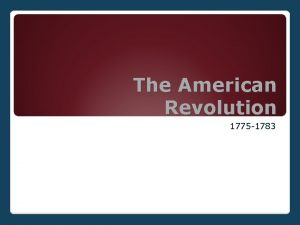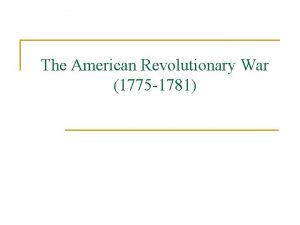American Revolutionary War War of Independence 1775 1783






















- Slides: 22

American Revolutionary War (War of Independence) 1775 – 1783 American Revolution

The political and economic reality before the American Revolution • French and Indian War (1754 – 1763) • Colonists tightly linked to the Crown – politically, economically, and emotionally – yet: Albany Congress and Albany Plan – 1754 • delegates from 7 colonies meet in Albany, New York • What happened between 1763 – 1776, that destoryed these bonds?

French and Indian War (1754 – 1763) • • • American front of the Seven Years' War 1763 - Treaty of Paris The British conquer Canada Quebec Royal Proclamation of 1763 – Indian Reserve – Restrictions on settlement • Quebec Act – 1774 • 10. 000 British troops to be stationed permanently in the colonies – who should pay these troops? • The British Crown heavily indebted in result of the war


Sugar Act – 1764 • Earlier Molasses Act (1733) – never effectively executed – was to limit imporation of molassa from non-British providers. Colonists responded by vast smuggling • Sugar Act LOWERS the taxes on imported molassas and sugar, yet introduces new measures of enforcing the tax. It also intrudoces a tax on a number of goods exported from the colonies (lumber) • Opposition (not widespread) from the colonists, whose economies are affected by the Act. In Massachussets early calls for a boycott of British goods (Samuel Adams)

Currency Act - 1764 • Colonies forbidden to issue paper money (Colonial Scrip) • Colonies to trade only in gold or silver backed money • Benjamin Franklin believed this was the true reason for the Revolution

Stamp Act - 1765 • Practially all printed materials are to carry a royal Tax stamp • "No taxation without representation" – British subjects cannot be taxed without their consent – representation in Parliament • Committees of Correspondence • violent opposition in the streets • Sons of Liberty

Stamp Act • Stamp Act Congress – delegates from 9 colonies – 14 points of The Declaration of Rights and Grievances • colonists have the rights of the Englishmen • sent to the King and to Parliament • Stamp Act repealed in 1766 – yet Declaratory Act passed by the British Parliament to secure its right to regulate the colonies

Townsend Acts - 1767 • New duties on paper, paint, lead, glass, and tea to take "the power of the purse" from the colonies – limit their influence on the colonial governors and judges • customs officials reinforced to challenge smuggling • Boycotts of British goods • British occupation of Boston - 1768 • Boston Massacre – 1770 – five civilians killed

Tea Act – 1773 • East India Company allowed to trade directly with the colonies requiring only an import tax (Townsend Tariff) – effectively – given a monopoly in trading tea • Tea Act validated the tea tax imposed by the Townsend Acts • Legally imported tea cheaper than smuggled Dutch tea. Smuggling of tea likely limited. • In Charleston, Philadelphia and New York ships woth British tea forced to return to England • Boston Tea Party followed

Boston Tea Party – 1773

Boston Tea Party • a group of colonists, some diguised as Mohawk Indinas, destroy the cargo of British Tea in Boston (three ships) • Parliament responds with Coercive Acts (1774)

Intolerable Acts / Coercive Acts 1774 • response to the Boston Tea Party • Boston Port Act – port of Boston closed • Massachussets Government Act – all positions appointed by governor or the king • Administaration of Justice Act (Murder Act) – royal officials may be tried in Britain • Quartering Act – British troops may be quartered in private unoccupied buildings • Quebec Act – Province of Quebec to be governed along European (French) tradition of governance

(First) Continental Congress - 1774 • delegates from 12 colonies (Georgia did not send delegates) • Declaration and Resolves (Declaration of Colonial Rights) – boycott of British goods (import from Britain dropped over 95%) – exportation to Great Britain stopped – Continental Association – Colonies to convene again in 1775 (Second Continental Congress)

War breaks out • 19. April 1775 – Lexington and Concord

Second Continental Congress 1775 • Continental Army – George Washington appointed commander • Olive Branch Petition • Reslolution of independence (Lee resolution) – 2. July 1776 – John Adams • Declaration of Independence – 4. July 1776 • Articles of Confederation – 1777 (ratified in 1781) – Congress of the Confederation

Declaration of Independence (4. July 1776)


Declaration of Independence • 4. July 1776 – however independence voted on 2. July 1776 • written mostly by Thomas Jefferson, assisted by Benjamin Franklin and John Adams • draws from ideas of John Locke, Constitution of Virginia, Virginia Declaration of Rights, • natural rights • rejects the divine theory of government and embraces the social contract model of governance • parts – preamble – list of charges against King George

Declaration of Independence The Unanimous Declaration of the Thirteen United States of America. When, in the course of human events, it becomes necessary for one people to dissolve the political bonds which have connected them with another, and to assume among the powers of the earth, the separate and equal station to which the laws of nature and of nature's God entitle them, a decent respect to the opinions of mankind requires that they should declare the causes which impel them to the separation.

Declaration of Independence We hold these truths to be self-evident, that all men are created equal, that they are endowed by their Creator with certain unalienable rights, that among these are life, liberty and the pursuit of happiness. That to secure these rights, governments are instituted among men, deriving their just powers from the consent of the governed. That whenever any form of government becomes destructive to these ends, it is the right of the people to alter or to abolish it, and to institute new government, laying its foundation on such principles and organizing its powers in such form, as to them shall seem most likely to effect their safety and happiness. Prudence, indeed, will dictate that governments long established should not be changed for light and transient causes; and accordingly all experience hath shown that mankind are more disposed to suffer, while evils are sufferable, than to right themselves by abolishing the forms to which they are accustomed. But when a long train of abuses and usurpations, pursuing invariably the same object evinces a design to reduce them under absolute despotism, it is their right, it is their duty, to throw off such government, and to provide new guards for their future security. --Such has been the patient sufferance of these colonies; and such is now the necessity which constrains them to alter their former systems of government. The history of the present King of Great Britain is a history of repeated injuries and usurpations, all having in direct object the establishment of an absolute tyranny over these states. To prove this, let facts be submitted to a candid world.

Articles of Confederation - 1777
 10 causes of the american revolution
10 causes of the american revolution Ticonderoga war 1775 winner
Ticonderoga war 1775 winner Us in 1783
Us in 1783 Under british rule, 1763-1783
Under british rule, 1763-1783 Catecismo de la iglesia 1783
Catecismo de la iglesia 1783 Treaty of paris 1783 apush
Treaty of paris 1783 apush Previous owner of british cession
Previous owner of british cession Us in 1783
Us in 1783 Catecismo de la iglesia 1783
Catecismo de la iglesia 1783 1783-1607
1783-1607 Revolutionary literature definition
Revolutionary literature definition Revolutionary period in american literature
Revolutionary period in american literature Revolutionary war blockade
Revolutionary war blockade British strengths and weaknesses
British strengths and weaknesses Swampfox mohawk
Swampfox mohawk Turning point of the revolutionary war
Turning point of the revolutionary war Famous people of the revolutionary war
Famous people of the revolutionary war Map of the battle of fort ticonderoga
Map of the battle of fort ticonderoga Music of the revolutionary war
Music of the revolutionary war American revolution interactive notebook
American revolution interactive notebook Revolutionary war diorama
Revolutionary war diorama Was the revolutionary war inevitable
Was the revolutionary war inevitable Revolutionary war jeopardy
Revolutionary war jeopardy
